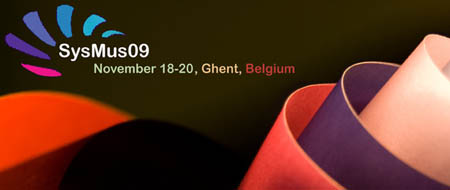
IPEM – Institute for Psychoacoustics and Electronic Music
Ghent, Belgium
November 18-20
Sysmus09 is a conference of students of Systematic Musicology with focus on the ongoing research developed by PhD and advanced Master students from the SysMus discipline and other disciplines engaged in music research. It is a privileged forum to disseminate new research initiatives and create international networks of research. In this second edition we will discuss and explore the potential and problems of the interdisciplinary tasks that challenges all spheres of SysMus and most part of the research in music. The conference includes the publication and presentation of peer-reviewed papers and posters, keynotes with top researchers in the area, workshops and social activities hosted in Gent, Belgium, one of the most enchanting Flemish cities.
The SysMus09 conference is being organized by PhD students of IPEM – Ghent University, after the successful Sysmus08 initiative, started in Graz, Austria.
All research involving meaning, description, and technological mediation of music can be related to musicology. However, the complexity of musical engagement in socio-cultural contexts engenders different networks of research and knowledge, with distinct interdisciplinary configurations, methods and specializations. Systematic musicology specifically deploys this methodological diversity so as to approach each musicological question with a distinct configuration of methods. In doing so, systematic musicology often bridges methodological foundations of sciences with the critical analysis from humanities. It promotes the study of aesthetics, semiotics, and cultural studies by incorporating empirical and data-oriented methods into the methodological framework. It relies on paradigms from different disciplines as diverse as the philosophy of aesthetics, theoretical sociology, semiotics, and music criticism, combined with strategies derived from empirical psychology, acoustics, physiology, neurosciences, cognitive sciences, computing, and others.
Unfortunately, the concentration of efforts on methodological diversity and broad research questions may lead students to superficial discussions, disconnected results or research that is alienated from the musical matter. One of the biggest challenges for researchers in systematic musicology, therefore, is to learn how to deal with the interdisciplinary nature inherent to their own field. Several questions are raised by this problem:
- How to guide yourself through innumerable methods, resources, and uncertain methodological pathways?
- How to design and execute interdisciplinary research?
- How to communicate with our partners: engineers, psychologists, and musicians?
- How to build an active network of collaborations within this interdisciplinary field?
These questions, together with hands-on courses in writing, presentation, and conference skills, will be addressed in SysMus09.
For more information visit http://www.ipem.ugent.be/sysmus09/
